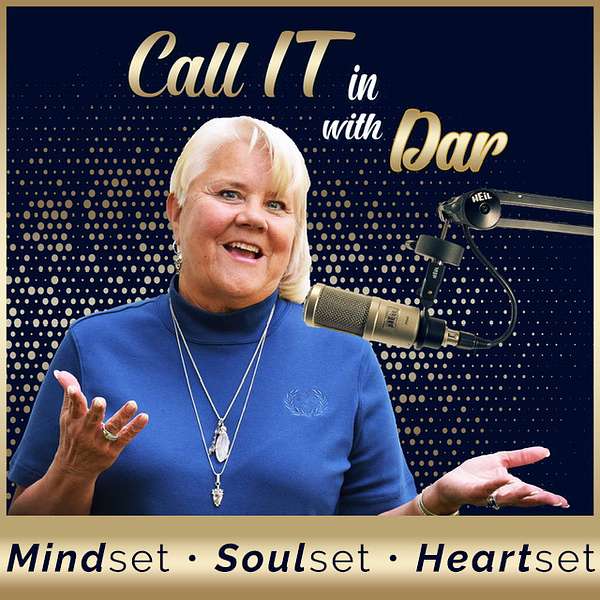
Call IT In with Dar
Call IT In with Dar
Trust: A Key to Joy
Use Left/Right to seek, Home/End to jump to start or end. Hold shift to jump forward or backward.
Today, we’re talking about something both ancient and revolutionary: trust—and how an unshakable belief in positive outcomes can lead to a more joyful, fulfilling life. “Let’s start with a big question: What is trust, really? At its core, trust is the belief that things will turn out well, or that others have good intentions. It’s the glue of every relationship, the bedrock of successful communities, and—here’s the kicker—it’s also a major predictor of happiness. A 2016 study from the Journal of Happiness Studies found that people who have higher levels of interpersonal trust report significantly greater life satisfaction. Not marginally more. Significantly. And it’s not just about trusting other people. It’s about trusting life itself. Psychologists call this positive expectancy—a mental habit of expecting things to work out, even when we can’t see how just yet. Trust that you can thrive at any age. Right now I am holding space for women 50 and older who trust that it’s never too late to claim their life purpose, break free from fear and old patterns to fully embrace this new season of life. Set up a “Claim Your Purpose Strategy Session”. Call in joy and trust at any age. Thanks for tuning into “Call IT in With Dar!”
Full Show Notes can be found at CallITInPodcast.com
Photo credit: Rebecca Lange Photography
Music credit: Kevin MacLeod Incompetech.com (licensed under Creative Commons)
Production credit: Erin Schenke @ Emerald Support Services LLC.
Grab Dar's Flight Deck Oracle Card Deck
Take Dar's Archetype Quiz
Today, we’re talking about something both ancient and revolutionary: trust—and how an unshakable belief in positive outcomes can lead to a more joyful, fulfilling life. “Let’s start with a big question: What is trust, really? At its core, trust is the belief that things will turn out well, or that others have good intentions. It’s the glue of every relationship, the bedrock of successful communities, and—here’s the kicker—it’s also a major predictor of happiness. A 2016 study from the Journal of Happiness Studies found that people who have higher levels of interpersonal trust report significantly greater life satisfaction. Not marginally more. Significantly. And it’s not just about trusting other people. It’s about trusting life itself. Psychologists call this positive expectancy—a mental habit of expecting things to work out, even when we can’t see how just yet. Let’s get into a bit of brain science. When we trust—whether it's in a person, a process, or the future—our brain releases oxytocin, often called the “bonding hormone.” This hormone is associated with connection, safety, and reduced stress. At the same time, trust lowers cortisol, the body’s main stress hormone. In other words: the more we trust, the calmer and more joyful we feel. A 2005 study at Claremont Graduate University led by Dr. Paul Zak, a pioneer in neuroeconomics, found that oxytocin plays a key role in fostering cooperation and generosity. The participants who were “trusted” in the experiment were significantly more likely to behave in a prosocial, generous way. So what’s the takeaway? Trust begets joy. Joy begets generosity. Generosity feeds back into trust. It’s a beautiful, upward spiral. Let me tell you a powerful story about trust in the face of the unthinkable. You’ve probably heard of Viktor Frankl, a Holocaust survivor and the author of Man’s Search for Meaning. Despite being imprisoned in Auschwitz, Frankl wrote that those who survived weren't necessarily the strongest, but those who held onto hope—those who believed that there was meaning and purpose, even in suffering. Frankl’s belief in a positive outcome—whether in this life or beyond—was a radical form of trust. It gave him the resilience to endure, and it inspired millions. His life is a case study in how belief in the good can literally be life-saving. He wrote: “Everything can be taken from a man but one thing: the last of the human freedoms—to choose one’s attitude in any given set of circumstances. “That attitude? Trust. So how do we build this kind of trust? It’s not about ignoring reality or pretending everything is perfect. It’s about choosing where to place our attention. It’s about mental training. Here are three practices backed by research:
1. Gratitude journaling – A 2003 study by Emmons & McCullough showed that people who wrote down three things they were grateful for each day reported significantly more optimism.
2. Visualization of positive outcomes – Athletes and CEOs do this all the time. Seeing success in your mind builds confidence—and trust—in your own path.
3. Conscious acts of trust – Whether it's delegating something small, expressing vulnerability to a friend, or simply believing your day will go well, these choices build your trust muscle over time.
So if you're feeling overwhelmed, uncertain, or stuck, try this: trust that there’s more unfolding than you can see right now. Trust that joy is still possible. That good things are on their way—even if the path isn’t clear yet. It’s not naive. It’s brave. And the research? It’s on your side. Remember, the most powerful thing you can do today is trust that something beautiful is on its way.
Trust that you can thrive at any age. Right now I am holding space for women 50 and older who trust that it’s never too late to claim their life purpose, break free from fear and old patterns to fully embrace this new season of life. Set up a “Claim Your Purpose Strategy Session” atdarsdivineconnections.com - link provided in the show notes. Call in joy and trust at any age. Thanks for tuning into “Call IT in With Dar!”
.jpg)